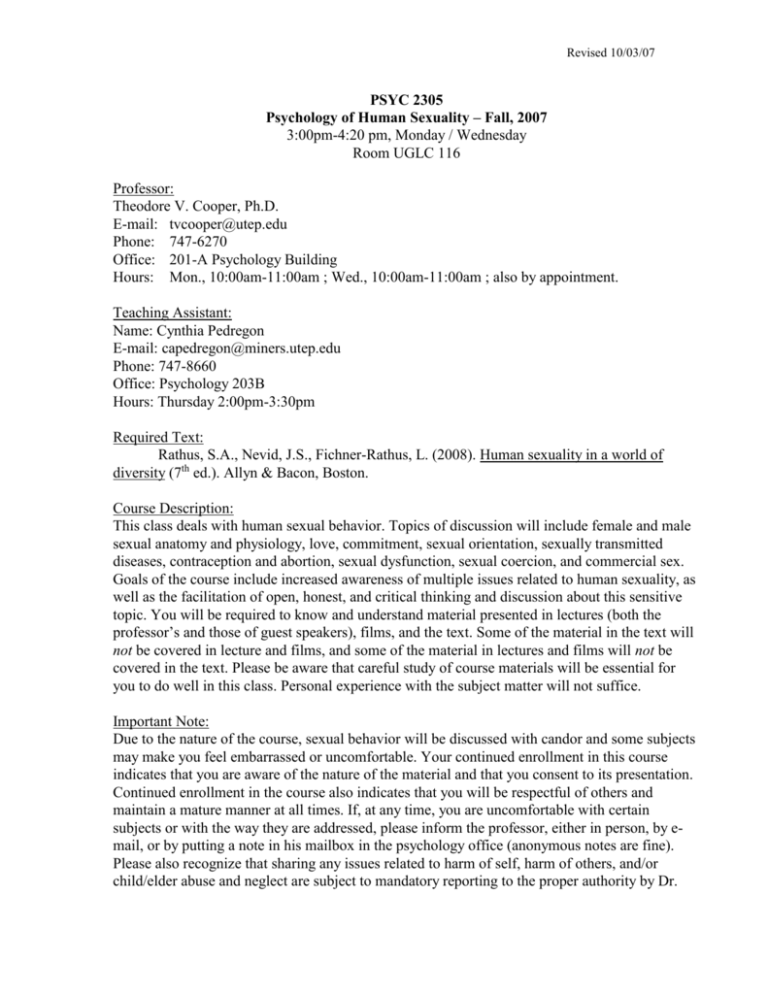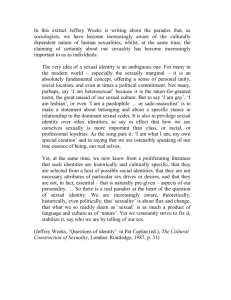
Revised 10/03/07
PSYC 2305
Psychology of Human Sexuality – Fall, 2007
3:00pm-4:20 pm, Monday / Wednesday
Room UGLC 116
Professor:
Theodore V. Cooper, Ph.D.
E-mail: tvcooper@utep.edu
Phone: 747-6270
Office: 201-A Psychology Building
Hours: Mon., 10:00am-11:00am ; Wed., 10:00am-11:00am ; also by appointment.
Teaching Assistant:
Name: Cynthia Pedregon
E-mail: capedregon@miners.utep.edu
Phone: 747-8660
Office: Psychology 203B
Hours: Thursday 2:00pm-3:30pm
Required Text:
Rathus, S.A., Nevid, J.S., Fichner-Rathus, L. (2008). Human sexuality in a world of
diversity (7th ed.). Allyn & Bacon, Boston.
Course Description:
This class deals with human sexual behavior. Topics of discussion will include female and male
sexual anatomy and physiology, love, commitment, sexual orientation, sexually transmitted
diseases, contraception and abortion, sexual dysfunction, sexual coercion, and commercial sex.
Goals of the course include increased awareness of multiple issues related to human sexuality, as
well as the facilitation of open, honest, and critical thinking and discussion about this sensitive
topic. You will be required to know and understand material presented in lectures (both the
professor’s and those of guest speakers), films, and the text. Some of the material in the text will
not be covered in lecture and films, and some of the material in lectures and films will not be
covered in the text. Please be aware that careful study of course materials will be essential for
you to do well in this class. Personal experience with the subject matter will not suffice.
Important Note:
Due to the nature of the course, sexual behavior will be discussed with candor and some subjects
may make you feel embarrassed or uncomfortable. Your continued enrollment in this course
indicates that you are aware of the nature of the material and that you consent to its presentation.
Continued enrollment in the course also indicates that you will be respectful of others and
maintain a mature manner at all times. If, at any time, you are uncomfortable with certain
subjects or with the way they are addressed, please inform the professor, either in person, by email, or by putting a note in his mailbox in the psychology office (anonymous notes are fine).
Please also recognize that sharing any issues related to harm of self, harm of others, and/or
child/elder abuse and neglect are subject to mandatory reporting to the proper authority by Dr.
Revised 10/03/07
Cooper and his T.A. This applies to written assignments, class discussion, and one on one
discussions with Dr. Cooper and/or the T.A. during office hours.
Academic Dishonesty
Academic dishonesty is prohibited and is considered a violation of the UTEP Handbook of
Operating Procedures. It includes, but is not limited to, cheating, plagiarism, and collusion.
Cheating may involve copying from or providing information to another student or possessing
unauthorized materials during a test. Plagiarism occurs when someone intentionally or knowingly
represents the words or ideas of another person’s as one’s own. And, collusion involves
collaborating with another person to commit any academically dishonest act. Any act of
academic dishonesty attempted by a UTEP student is unacceptable and will not be tolerated.
Violations will be taken seriously and will be referred to the Dean of Students Office for possible
disciplinary action. Students may be suspended or expelled from UTEP for such actions.
Attendance:
Attendance will be taken randomly six times during the semester. Each student is allowed to miss
one class of those six. Missing each of the other five attendance checks will count two points
against your final grade. For example, a student who regularly attends class and is absent during
one attendance check will not have any points deducted from the final grade. However, a student
who is absent for 3 of the 6 attendance checks will have four points deducted from the final grade
(1 free absence; 2 absences with 2 point deductions).
Exams:
Three exams will be given. Each will consist of 50 multiple-choice questions taken from the
lectures, films, and text. Each question will be worth two points. The exams are not cumulative.
Makeup exams will not be given unless a student is engaged in university-related activities
during the normal exam time and has followed the appropriate procedure for notifying the
professor of the impending absence (see the Undergraduate Catalog).
Grading:
The course grade will be based upon the average of two of the three exams. Students’ lowest
grade of Exam I or II will be dropped. Students’ grades on the Final Exam (Exam III) will be
calculated into the final course grade. Also, attendance scores will be taken into account for the
final grade as detailed above. If you already know you will not be able to take the final on the
date it is scheduled, you need to talk to the professor about dropping the class. Final letter grades
may be assigned on a curve, but ranges will be no more conservative than 90% = A, 80% = B,
70% = C, 60% = D, and < 60% = F.
Important Dates (reading assignments may vary):
08/27
Review syllabus and course introduction
08/29
Chapter 1
Human sexuality, critical thinking, and perspectives.
Revised 10/03/07
09/05
Chapter 2
Research methods in human sexuality.
09/10
Chapter 3
Female anatomy.
09/12
Chapter 3
Menstruation.
09/17
Chapter 4
Male sexual anatomy.
09/19
Chapter 4
Male sexual diseases and functions.
09/24
Chapter 6
Gender identity and differentiation.
Possible guest speaker: Gillian Gallentin
09/26
Chapter 6
Gender roles, stereotypes, and differences.
Review for Exam I.
10/01
EXAM I
10/03
Chapter 5
Sexual arousal and response.
10/08
Chapter 8
Relationships and communication.
10/10
Chapter 9
Sexual behavior and fantasies.
10/15
Chapter 15
Sexual dysfunctions.
10/17
Chapter 11
Childbirth and postpartum.
10/22
Exam II Review
10/24
Chapter 11
Conception and pregnancy.
Guest Speaker: Dr. Schwartz
Revised 10/03/07
10/29
EXAM II
10/31
Chapter 12
Contraception.
11/05
Chapter 12
Abortion.
Review for Exam II.
11/07
Chapter 10
Sexual orientation.
Possible guest speaker panel
11/12
Chapter 17
Atypical sexual variations.
Paraphilias.
11/14
HAPPY ABCT Conference
No Class
11/19
Chapter 17
Paraphilias: perspectives and treatment.
11/21
Chapter 18
Sexual coercion: rape.
Possible guest speaker: Rebecca Orndorff - Rape
11/26
Chapter 18
Sexual coercion: child abuse and harassment.
11/28
Chapter 16
Sexually Transmitted Infections (STIs).
Bacterial and vaginal infections.
Possible guest Speaker:Amalia Dudzienski- STIs
12/03
Chapter 16
STIs.
Viral Infections and prevention.
Possible guest speaker: Lorenzo Sias- HIV
12/05
Chapter 19
Commercial sex
Review for FINAL EXAM.
Revised 10/03/07
12/10
FINAL EXAM: 1:00pm-3:45pm (Be sure to confirm on exam schedule).








